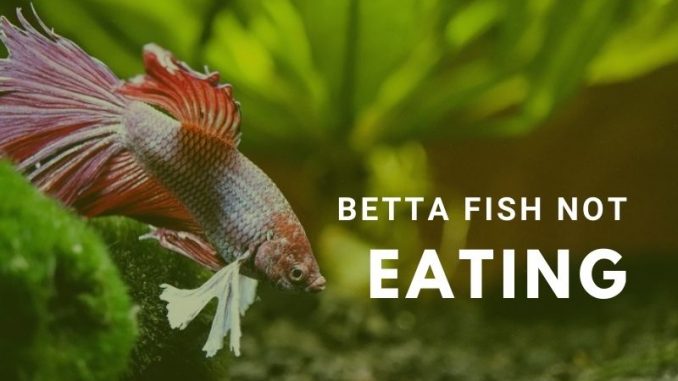
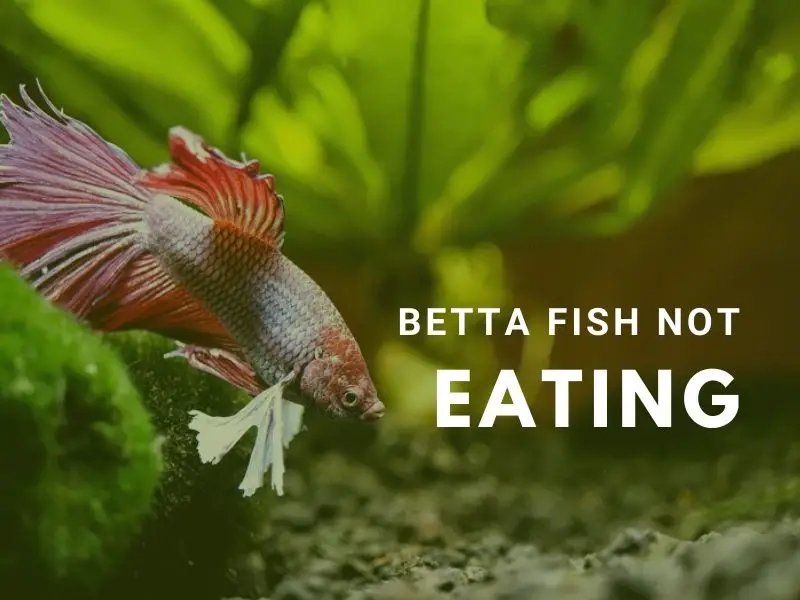
If you are a keen aquarist, you may become very concerned if you observe problems like your betta fish not eating. There can be many causes of betta fish not eating, and the situation could become serious if not dealt with quickly.
If you notice that the food is being left uneaten, you will want to establish why your betta fish is not eating. When a fish stops eating, it could be an indication of numerous problems and needs to be investigated.
This article will explore some of the problems related to betta fish not eating and try to offer some suggestions to remedy the situation before it becomes a serious problem.
Is Your Betta Fish Not Eating, Or Does It Only Look Like It Isn’t?
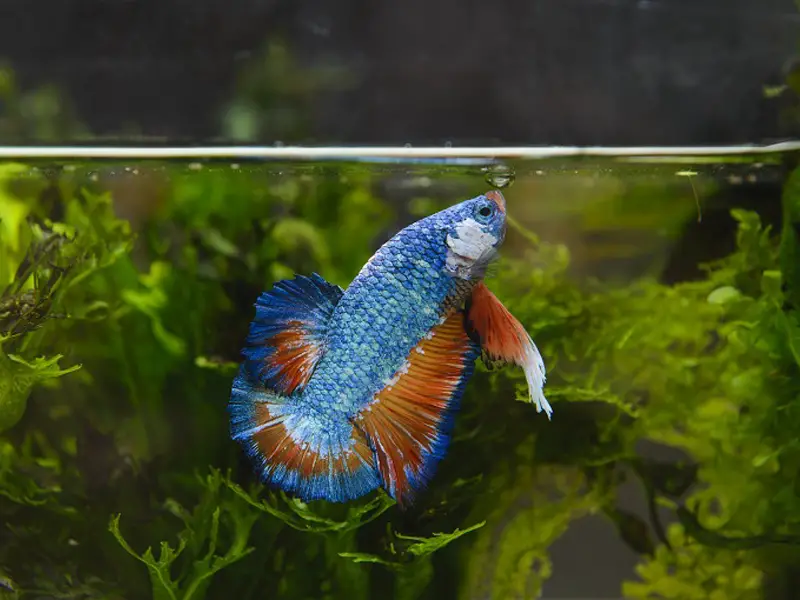
Before we examine all the possible reasons for your betta fish not eating, let us consider what else might actually be happening.
It may look like your betta fish is not eating when in actual fact, it is, but you just don’t realize it.
You may be overfeeding your fish, so some food remains on the surface of the water, floating around in the tank, after it has eaten its fill.
When you see food floating in the water, you then become concerned and think that your betta fish is not eating, but it has actually eaten enough, and the food that remains is the unwanted excess.
Is It Dangerous To Overfeed Betta Fish?
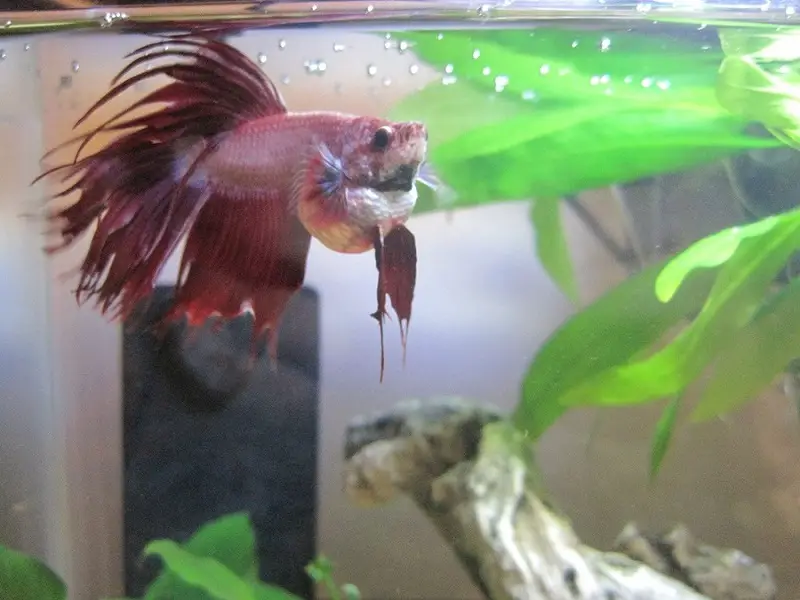
It is important to make sure that you only offer as much food as your betta fish needs. Too much food can cause serious problems.
A betta is a small fish. Its internal organs are very small. Its stomach is approximately the same size as one of its eyes, which is tiny. Therefore it can only digest very small quantities of food at any one time.
But, like most of us, your fish may really enjoy his food and will continue eating even after he has had enough. If your fish eats too much, it will become bloated and ill.
Eating too much can cause severe constipation and other problems in the betta’s digestive system. It may not be able to recover from this and could eventually die as a result of overfeeding.
If you are overfeeding your fish, it can cause other problems, even if it does not eat all of the food you are giving. If there is leftover food floating around in the tank, it can go bad and contaminate the water. This can cause the fish to become ill.
For all of these reasons, it is important to adhere to the recommended feeding quantities and frequency. If you are doing all the right things with his food, but your betta fish is truly not eating, you need to get to the bottom of it and try to solve the issue.
Why Is Your Betta Fish Not Eating?
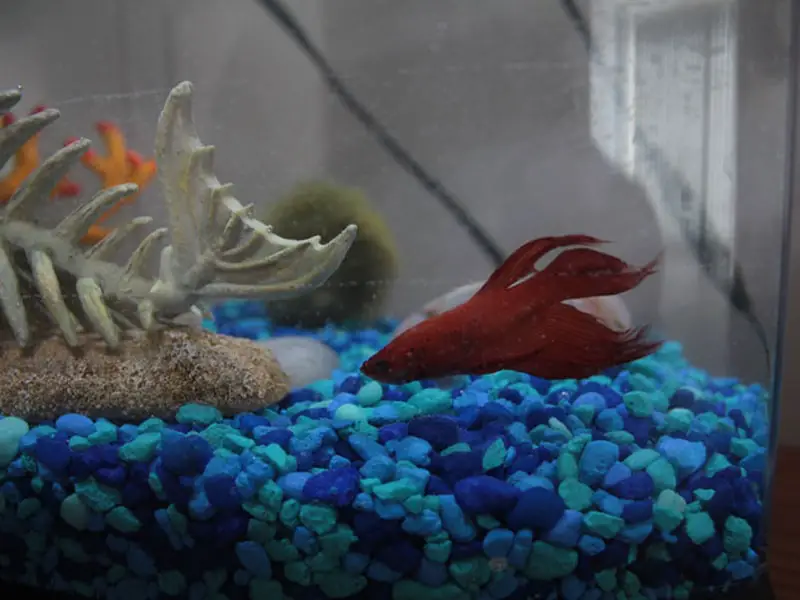
Once you have established that your betta fish is really not eating, it is important to figure out why. There are two possible elements to consider here.
- There may be an external factor, like something wrong with the food.
- There may be something wrong with your betta fish.
Let us first consider scenario number 1; there may be something wrong with the food.
How would you know if there is something wrong with the food?
In order to establish this, you will need to observe the fish closely at feeding time. Watch it carefully, and ask yourself the following questions:
Did the fish approach the food and then swim away, or even perhaps have a tiny nibble, and then back off? Or did the fish completely ignore the food and display absolutely no interest in it?
If the former is the case, then there is likely something wrong with the food. I
f the fish approaches the food, possibly even tastes it, and then swims away without eating it, something about the food is putting him off.
He is clearly interested in the food and wants to eat it, but something tells him not to.
This scenario of something being wrong with the food is an external cause of betta fish not eating and is far easier to establish and to fix, so we will discuss that first.
What could be wrong with the food?
There are numerous reasons why your fish may reject the food.
- Bettas are carnivorous fish. They enjoy a diet made up of meat. The best choice of food for your betta fish is meaty foods such as bloodworms and brine shrimp. However, when feeding live food, it is crucial that the food should be fresh. If it is even slightly off, your betta fish will most probably smell that it is not right, and he will not eat it.
- It is also possible to feed betta fish frozen foods. If this is your preferred method, always make sure that the food is fully thawed before putting it in the tank. If it is still even slightly frozen when you place it in the water, the texture of the food will be affected, and the fish is likely to reject it. Remember to take the food out of the freezer well before feeding time to give it sufficient time to defrost completely.
- Freeze-dried foods are a convenient choice of food for betta fish. It is important to check the ‘Use by date on these foods, as they can also go off quite easily. If they are no longer fresh, your fish is not going to eat them.
- Commercial fish flakes and pellets are also convenient foods to offer, but these should always be high quality and made by a reputable brand. Tropical fish have specific nutritional needs. If the food that you are buying does not meet all of those needs, your betta fish may not want to eat it. Once again, do not use it if it has passed its ‘Sell by” date.
- Storage of your fish food is an important consideration. All fresh food should be stored in the fridge, and frozen food should be stored in the freezer. Dried foods should be stored in a cool, dark place. Do not leave the jar in the sun. The heat will affect the quality of the food.
- If your betta fish is not eating from the time that you first bring it home from the pet store, it could be that it is confused about its food. The store owner may have been feeding one type of food while you are now offering something else. Find out what food the fish was being given in the store. Try to offer the same food, at least until he is used to his new environment. If you want to change the food, wait a few days. Once he has settled down, you can start to gradually introduce the new food little by little, giving him a chance to get used to it slowly.
All of the above possibilities should be considered if you are concerned about your betta fish not eating. However, if you have established that there is definitely nothing wrong with the food, then you need to investigate other possibilities.
There may be something wrong with the fish, or perhaps the water.
If your betta fish completely ignores the food you are offering and shows no interest in eating at all, there is possibly something else.
Possibly your betta fish is not eating because he is ill, or some other reason is stopping him from eating.
How would you know if there is something wrong with your betta fish?
Numerous issues could be the reason for your betta fish not eating. A lot of things could cause your fish to lose its appetite. Some are easier to deal with, while others may, sadly, be fatal.
- Betta fish are quite high strung and do not react well to stress. If you have only just brought your betta home from the pet store, they may be feeling very stressed from the move. It may also not immediately feel comfortable in its new aquarium. These factors can cause the fish to stop eating. Fortunately, this kind of problem is usually temporary. The fish probably just needs some time to settle down and become used to its new environment. Continue to offer the same food that it was eating in the store, at least for the first few days, in order to give your betta as much familiarity as possible. This will help to minimize the stress of the move. If the food you have offered remains uneaten, do not leave it in the water. Remove all uneaten food after 30 minutes. If left in the water, it will start to rot and could contaminate the water. This will cause a whole new set of problems.
- Have you recently introduced a new tank mate to the aquarium? The betta fish is a little territorial creature. If you have recently added another fish to his tank, he may become stressed and anxious about his territory being invaded. This can cause him to stop eating. If this is the case, it will usually resolve itself within a day or two, as he gets used to the new company. But if he does not start to eat within two days, you may need to separate him from the new addition.
- Is your betta fish staying close to the bottom of the tank, and does it appear to be lethargic while simultaneously refusing food? Check the temperature of the water in your aquarium. If the water temperature drops too low, this could be a reason for your betta fish not eating. Bettas do not like cold water. The temperature of the water in their tank should be maintained at a steady 75°-76° Fahrenheit. Once you have corrected the water temperature, your betta fish will probably be rejuvenated and will start eating again. It is helpful to keep a water heater in the tank in order to keep the temperature stable.
- Check the water parameters in your aquarium. Things like mineral levels, pH, and water hardness are all relevant factors. If any of these are off balance, your betta fish may respond by going on a hunger strike. Once the imbalance has been rectified, he will probably start eating again.
If you have ruled out all of the above, and your betta fish is still not eating, it may be sick. Numerous different illnesses can affect betta fish, and if your fish has been afflicted with any of these, it will stop eating.
The most common of these diseases are:
Fin Rot
A fish with fin rot will show some obvious signs. As its name suggests, this disease causes the fins to rot and disintegrate. It is caused by an infection and can be treated with medication.
Ich
Ich is a very common problem in a community aquarium. It is a highly contagious infection, causing the fish to develop a whitish film on parts of its body. It is essential to catch it early and start treatment as soon as possible to halt the spread of the infection.
Dropsy
Dropsy is a more serious condition. It is caused by malfunctioning internal organs and makes the fish retain water. This, in turn, causes severe bloating. The fish’s belly will become distended and bloated, making it look like it has ‘dropped’. Hence the name ‘Dropsy’.
It is very difficult to treat and, unfortunately, often has a bad outcome for the fish.
If you are concerned about your betta fish not eating, and you have ruled out all of the possible external causes, your fish could be sick.
It is advisable to discuss this with a veterinarian or an experienced fish store owner and follow their recommendations for treatment.
The sooner you can start treatment, the better the chances of the fish making a full recovery.


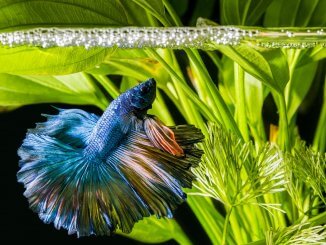
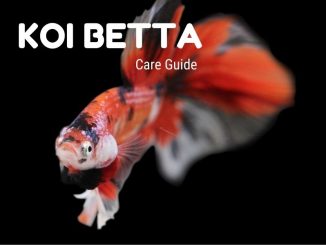

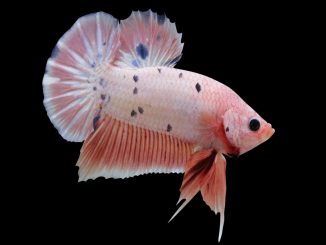
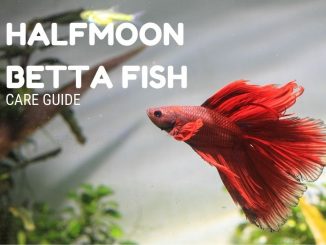
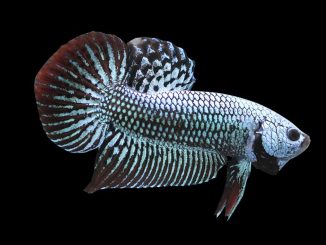
Be the first to comment